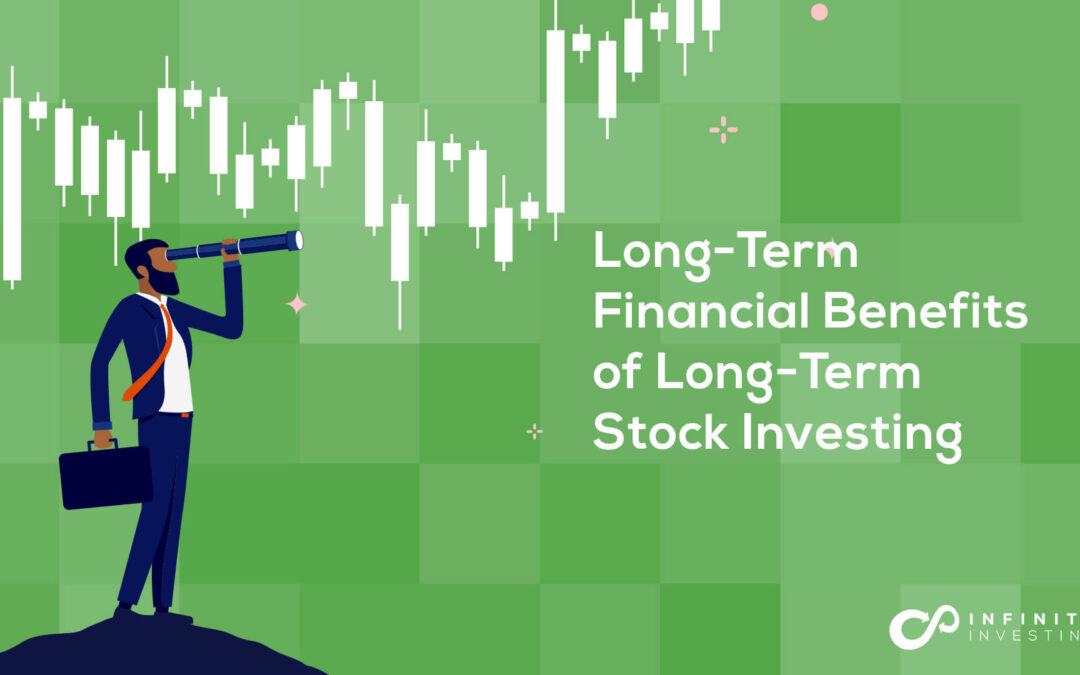
The stock market experiences many ups and downs, which may make investing seem intimidating to some. Investing long-term offers many benefits, including reduced risk and lower tax obligations. Investing in stocks long-term also allows you to recover from temporary market losses. This article reviews some of the top financial benefits of long-term stock investing.
Key Takeaways
- Long-term stock investing is any investment strategy involving buying and holding onto an asset for at least one year.
- Many investors can benefit from long-term stock investing, including those planning for retirement and investors with a low-risk tolerance.
- Historically, the stock market offers returns more often than it doesn’t, making a long-term investment strategy low-risk.
- Investing long-term allows you to take advantage of compounding interest and dividend reinvesting.
- You may qualify for a lower tax rate when you hold assets for more than a year.
What Is Long-Term Stock Investing?
Long-term stock investing is an investment strategy that involves buying and holding onto assets for one year or longer. Any investment you buy and sell in less than 12 months is short-term. Rather than aiming to earn returns after a few months, long-term investments can grow and increase in value due to compounding interest and reinvested dividends.
Many investors choose long-term stock investing because they don’t have to time the market or actively buy and sell assets.
Infinity Investing Featured Event
In this FREE event you’ll discover how the top 1% use little-known “compounders” to grow & protect their reserves. Our Infinity team of experts show you how to be the best possible steward of your finances and how to make your money and investments work for you instead of you working for them. Regardless of your financial situation today, you’ll have a road map to get to where you want to be.
Who Should Invest in Long-Term Stocks?
Long-term stocks may benefit many different investor types, including:
- Retirement planning: Long-term investments usually earn over the years, making them a good option for retirement planning.
- Low-risk investors: Investing long-term is considered a low-risk strategy. You may feel more comfortable investing in stocks long-term if you have a low to moderate risk tolerance.
- Passive investors: Long-term stocks require less active trading, making them an option for passive or hands-off investors.
- Limited fund investors: Because long-term stocks benefit from compounding interest, you don’t have to allocate a lot of your money to invest.
- High tax bracket investors: Long-term investments offer tax benefits, making them an option for investors in a high tax bracket. Long-term capital gains are taxed at a much lower rate than short-term gains.
- Diversification: Long-term stocks can also be a great way to diversify, making them a good addition to your portfolio if you’re already invested in moderate to high-risk assets.
Long-term stocks are an excellent option for any investor who wants to limit their risk and control taxes and costs.
Long-Term Financial Benefits of Long-Term Stock Investing
Here are a few of the top benefits of long-term stock investing:
Historical Returns
Historically, the stock market has returned an average of 10% per year. Additionally, the stock market has experienced only 27% of losses, making time in the market one of the most important predictors of success. This means that investing your funds into a long-term stock has the potential to earn returns more often than not.
Investing over the long term versus the short term makes it easier to accommodate the expected ups and downs of the market. Many investors also report that investing long-term helps remove emotion from the decision to buy or sell. Instead of buying when the market is doing well or selling when it’s not, you keep your investment invested until a set date. Some investors may even set a goal, and once they reach it, they buy or sell their stocks.
You can also review historical data of long-term stocks before buying. Previous history can help you predict your earnings when buying into specific stocks, including how long it takes to generate specific returns.
Compounding Interest
Long-term investments benefit the most from compounding interest. Compounding interest is the interest you receive on your principal plus any interest accumulated from previous investment periods. Compounding interest continues to accumulate and increase your returns over time. Essentially, compounding interest allows you to earn on your earnings. The longer you invest your money, the more you can benefit from compounding interest.
Convenient Investing
Beginner investors may find it easier to manage long-term investments. When you invest long-term, you don’t have to pay as close attention to the daily operations or financial reports of individual stocks. You also don’t have to spend time deciding when to buy or sell assets. One of the best hands-off investing strategies involves automatically transferring a percentage or set amount of your check each payday to buy into mutual funds or ETFs.
Frequent, convenient investments mean you buy stocks at different price points. While you may not earn as much when you buy at high prices, you’ll make up the difference when you buy at low prices.
Dividend Payments
Some long-term investments pay dividends, which are quarterly payments that the company issues to shareholders when they’re earning profits. Dividends are yours to spend as you want. One strategy to earn even more through long-term investments is reinvesting dividends. This strategy allows you to take advantage of compounding interest on dividend payments.
Low-Risk
Long-term investments tend to carry less risk than short-term ones. Stocks tend to be highly volatile and may shift as much as 10-20% in a single day. However, most stocks rebound eventually, allowing you to level out your losses when investing long-term. It can be incredibly difficult to time the market, and with long-term investing, you don’t have to. This makes investing in long-term stocks a great addition to an investment portfolio that includes short-term or riskier assets.
Reduced Tax Liabilities
Long-term capital gains are also taxed at a lower rate than short-term ones. The Internal Revenue Service (IRS) considers any assets bought and sold in the same year to be a short-term capital gain, which is taxed as ordinary income. While the tax rate depends on your tax bracket, it could be as high as 35%. Long-term assets, however, are taxed at a maximum of 20%, and some investors may qualify for tax rates as low as 0%.
You also won’t have to pay taxes on your returns until you withdraw them. If you buy and sell a stock in the same year, you’ll have to pay taxes on any returns you receive that same year. With long-term investments, you don’t have to pay taxes until you sell your asset. This allows you to time the sale of your investments to control how much you owe in taxes.
Lower Price
Long-term investments tend to cost less than short-term ones. This is because the stockholder or issuer knows it may take the buyer longer to earn returns. Additionally, long-term investments have fewer fees, making them more affordable. Many stock brokers or trading firms charge fees per transaction, known as commissions, so the more you buy and sell your assets, the more you pay.
Investing long-term offers many financial benefits, including lower taxes, historical returns, and compounding interest. If trying to time the market is unappealing to you, you might consider long-term investing.

Long-Term Stock Investing Options
You have a few options available when it comes to long-term stock investing, including:
- Individual stocks: When investing in individual stocks, you purchase partial company ownership. If the company does well, you’ll receive returns in relation to your invested percentage. Holding individual stocks long-term allows the company time to implement policies that earn them money, which earns you returns.
- Dividend-paying stocks: You could also invest in dividend-paying stocks, which are funds that pay investors when they earn. These regular cash payouts allow you to increase your returns by reinvesting them back into the market.
- Index or mutual funds: Index funds, or exchange-traded funds (ETFs), allow you to invest in a collection of stocks rather than a single one. Most index funds comprise top-performing companies in the U.S., making them a lower-risk investment.
- Real estate: Real estate is typically a long-term investment, whether you’re investing in physical assets and property or real estate stocks. Investing in real estate stocks in the long term gives your assets time to appreciate in value.
- Growth stocks: Growth stocks are individual stocks with a high return potential. These are typically through companies that generate faster revenue. However, it’s essential to remember that growth stocks are higher risk than other long-term investments.
Your best long-term stock investment depends on your financial goals and risk tolerance. How long you plan to hold onto your stocks also determines the best investment types for you. For example, if you plan to buy and sell within a few years, you may want to invest in real estate or growth stocks. If you plan to hold your assets for many years, mutual funds or real estate investment trusts (REITs) may work best for you. Either way, long-term stock investing offers many financial benefits.
Enroll in Our Paid Membership Today
Do you want to learn how long-term stocks can help you achieve your financial goals? Do you have questions about how best to structure your assets or how to plan for tax liabilities? Sign up for Infinity Investing’s 360 Pro membership today to learn how real estate and stock investing can help you generate passive income and earn financial freedom.
Infinity Investing Featured Event
In this FREE event you’ll discover how the top 1% use little-known “compounders” to grow & protect their reserves. Our Infinity team of experts show you how to be the best possible steward of your finances and how to make your money and investments work for you instead of you working for them. Regardless of your financial situation today, you’ll have a road map to get to where you want to be.

